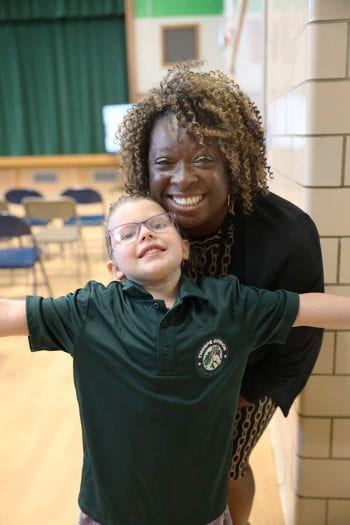Roller coasters are fun, but for safety’s sake, they must be designed, built and maintained by mechanical engineers. It’s a STEM career path that Adrianna Koty has enjoyed discussing recently with the fifth graders in her class at Thorpe Gordon STEM Academy in Jefferson City, Missouri.
“Giving students real-world problems to solve and think about is a good way to motivate them to understand science, technology, engineering and math,” Koty says. “The skills that are really needed in the workforce are not the skills being taught often enough in the classroom. It’s problem-based learning that is at the foundation of STEM.”
“The skills that are really needed in the workforce are not the skills being taught often enough in the classroom. It’s problem-based learning that is at the foundation of STEM”
Adrianna Koty
Over the summer, Koty and six other Thorpe Gordon educators were among 60+ K-8 teachers from across the region to participate in STEM Teacher Quality (TQ), a year-long, immersive STEM learning experience designed to equip teachers with the skills and confidence needed to see STEM all around them and bring it alive for their students. STEM TQ kicks off with a two-week summer institute that is packed with field excursions and immersive sessions that hone in on STEM integration. For the Thorpe Gordon team, the timing was perfect.
A New STEM Focus
When the doors opened at Thorpe Gordon for the start of the 2023-2024 academic year, there were serious, but exciting changes afoot. Just the year before, the Jefferson City School District announced that the school had been designated to become the district’s and the city’s first STEM Academy.

The transformation, led by Principal Delora Scaggs, is well underway, with building renovations that include a new STEM lab and inspiring spaces for students to learn and explore.
“I’m very excited to get the STEM lab up and running and getting the kids in there, so they can start all the new and fun activities they’re going to do,” says Scaggs.
This year, students wear uniforms for the first time and there’s a new energy throughout the building that’s palpable.
“There are a lot of eyes on us,” says Shelley Kleene, the Academy’s instructional coach. “There are people from all over our community wanting to know what this new school looks and feels like. There’s an increased sense of investment in what’s happening in our school. This is a great opportunity to give students living in our nearby community a chance to start seeing the world beyond their own neighborhood.”
Kleene and the rest of the Thorpe Gordon contingent participating in STEM TQ, walked away from the Summer Institute with a renewed energy to incorporate STEM into content they’re already teaching. Novel Engineering, an integrated approach to engineering and literacy, was especially exciting.
“With Novel Engineering, we’re going to introduce STEM through the books our students are already reading,” adds Scaggs. “This will make it more interesting and hands-on.”
“One of STEM TQ’s main tenets lies in the fact that authentic STEM integration is embedded within the content area curriculum, across all content areas. This requires a major shift in an educator’s thinking around STEM.”
Barbara Pener
To STEM TQ Program Director Barbara Pener, that’s exactly the point.
“Over the last few years, educators are feeling greater pressure to focus on the content area curriculum with little room for what might be viewed as extra,” Pener says. “One of STEM TQ’s main tenets lies in the fact that authentic STEM integration is embedded within the content area curriculum, across all content areas. This requires a major shift in an educator’s thinking around STEM.”
Pener, a longtime STEM educator herself, believes that the Thorpe Gordon team is taking all the right steps to make a successful STEM transformation.

“Our friends from Thorpe Gordon have one of the single greatest components needed to begin a STEM program: demonstrated support from the school district, (specifically administrative support),” adds Pener. “Additionally, the STEM TQ Institute consistently communicates the importance of creating a core team within a building or district that will serve as STEM catalysts. This core team shares a commitment to authentic STEM integration in the classroom, serving the school/district by facilitating workshops, planning STEM lessons, equipping colleagues in STEM lesson development, and creating spaces that inspire students to innovate. The team from Jefferson City arrived with this core group willing and ready to get to work.”
Creating a STEM pipeline

In addition to critical team building and shared learning about STEM integration, Thorpe Gordon’s team participated in a number of field trips to some of the St. Louis region’s most STEM-rich destinations, including the Saint Louis Zoo, MasterCard, Castlewood State Park and Worldwide Technology Raceway. Embedded throughout these excursions was a valuable glimpse into a wide variety of career pathways to STEM.
“On the first day of the summer institute, we started talking about the why of STEM,” says Koty. “The disparities that exist in STEM fields are there because not all students are even aware that these jobs are out there. They have to be shown pathways to STEM careers, and for that to happen, teachers have to know about them, too. What are the pathways to study abroad, or work at MasterCard or to design roller coasters? I’m thrilled about our school becoming a STEM Academy. It’s a great opportunity for our students, and for this community.”
Since 2011, STEM TQ has reached 1,070+ teachers throughout the Greater St. Louis region. Supporting high-quality STEM learning on the other side of the state is also a great opportunity for the ISP, says Executive Director Vicki May.
“We need as many educational leaders as possible to understand the value of creating equitable learning environments around all subjects, including STEM,” says May. “By investing in our teachers and students, we can encourage future scientists, researchers and problem-solvers to tackle some of our generation’s greatest challenges. This is work worth doing wherever we can.”
Media Contact: Anne Heinrich
